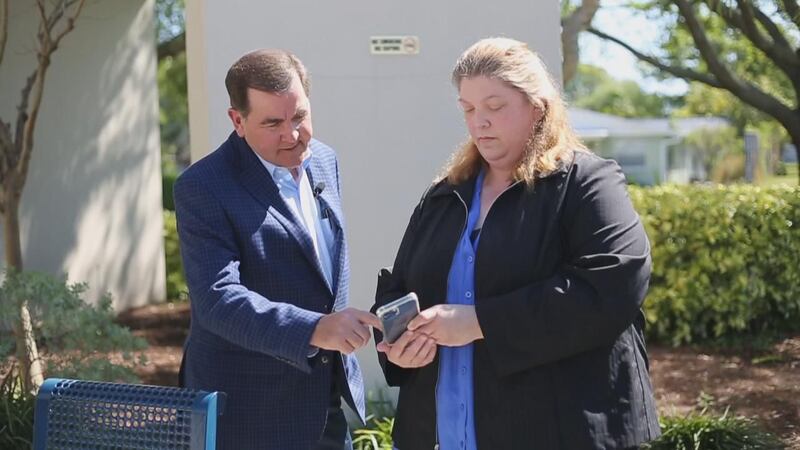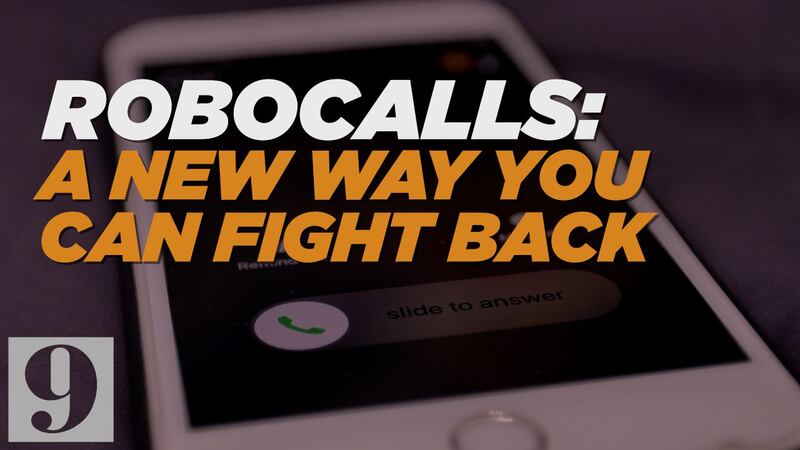ORLANDO, Fla. — There’s a new Florida law that’s supposed to stop robocalls and texts by requiring telemarketers to get your written consent first.
>>> STREAM CHANNEL 9 EYEWITNESS NEWS LIVE <<<
Action 9 couldn’t find the law being enforced, and discovered a class-action lawsuit that might put the new rule to the test.
Cheri Aul says she kept getting text messages like, “Say yes to your dress” and “Hellllo hot deals.”
Aul says she wasn’t shopping for a wedding dress, but David’s Bridal, a chain with stores across Florida, kept slamming her phone with unwanted texts.
“How frequent did it become?” Action 9′s Todd Ulrich asked.
“Four and five a day, every day,” Aul replied.
She deleted the messages for a week, then she started fighting back.
“How did you respond to them?” Ulrich asked.
Read: Attorney General announces new ‘Scams at a Glance’ resource as robotexts outpace robocalls
“I found the opt-out number and I texted ‘Stop,’” Aul said.
Phone records show David’s Bridal confirmed, time and time again, it would stop texting as state and federal law required; but according to Aul, her cellphone was blasted by more texts within 24 hours.
“Did this feel like a slap in the face?” Ulrich asked.
“It feels very demeaning, in a way. Some would say it’s harassment, and it’s borderline abusive,” Aul said.
Her anger turned to outrage when she discovered Florida’s new telemarketing law was supposed to crack down on robo calling and texting. The law took effect last July, and requires telemarketers to obtain written consent of the party they contact before it uses an automated system to call or text.
“That law was supposed to protect you,” Ulrich told Aul.
“Well, it was supposed to, but so far it hasn’t,” she said.
Read: Robocalls target consumers as millions add phone numbers to national do not call list
Aul turned to consumer attorney Billy Howard.
“It’s just another example of unstoppable robocalls,” Howard told Ulrich he reviewed months of Aul’s phone records and believes the new law violations are obvious.
“They do not have express written consent from Cheri Aul, period. It does not exist,” Howard said.
Howard filed a class-action lawsuit against David’s Bridal in county court. The lawsuit claims the company didn’t have written consent, seeks $500 for every text to consumers in Florida, and it directs the company to stop violating the robocall law.
Howard said the case sends a message. “It empowers people that they don’t have to take getting slapped. They can slap back.”
Action 9 checked telemarketing complaints statewide and found that investigations by Florida regulators had triggered minimal fines, despite the new get-tough robocall law.
Records from Florida’s Division of Consumer Services show the agency issued $91,000 in fines to violators between 2019-2020, but there were zero fines in 2021.
That really concerns Lori Morris. “I couldn’t believe anyone would talk to me like that.”
Read: ‘Very frustrating’: Popular investment app heavily fined by regulators
Morris complained to state regulators about robocalls from Green Energy Group. According to state corporate records and the Better Business Bureau, the company has an office near Orlando.
Morris said random Green Energy robocalls lasted for months and when she complained the caller cursed and threatened her. “The gentleman that was talking to me started saying he was going to (expletive) me, and he knows where I live and he would be there.”
BBB gives Green Energy an “F” rating for more than 50 complaints. Some consumers claimed they were harassed for years.
Ulrich went to the company’s listed address in Orange County.
“We have questions about robocall complaints with Green Energy,” he said.
“Oh, no idea. We haven’t had any Green Energy here in like five, six years,” a manager said.
Later, the owner said Green Energy has not been active for years and blamed rogue telemarketers for the robocalls.
Since stopping robocalls has been so challenging, Howard said the state law requiring written consent and his class-action lawsuit could turn the tide. “We should not be sitting around letting people illegally bombard our cellphones.”
Ulrich contacted David’s Bridal asking for a comment. The company has not responded.
In court, the company is seeking to have the case dismissed, and there is a conference scheduled for June.
Consumers should keep screen shots of all robocall numbers and texts so they can make a case in small-claims court or with state regulators.
©2022 Cox Media Group










